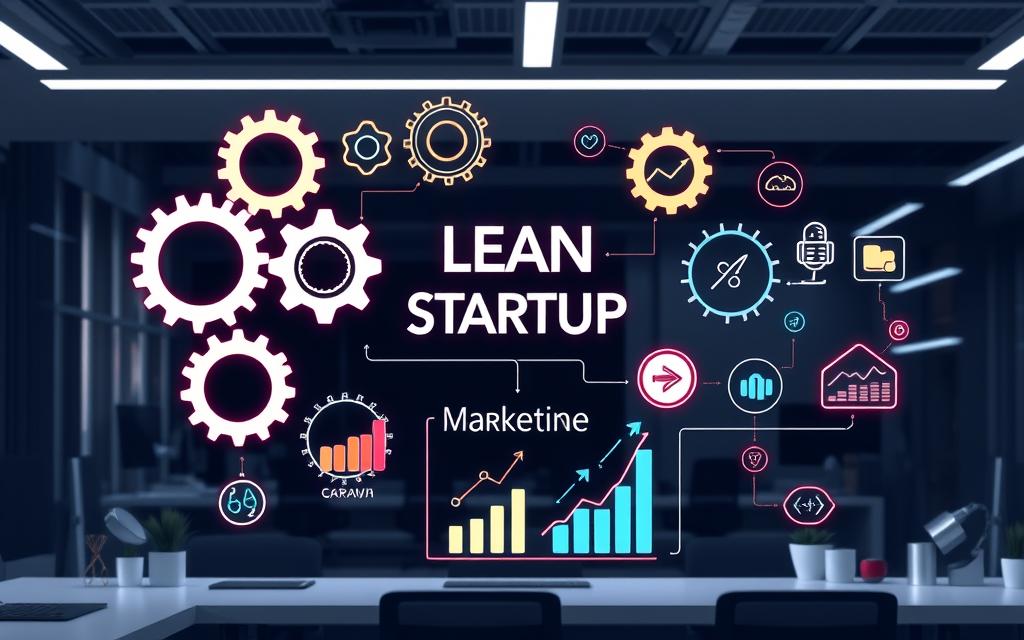The release of The Lean Startup by Eric Ries has significantly transformed the landscape of modern marketing and entrepreneurship. By promoting a methodology that challenges conventional business planning, it highlights the necessity of a flexible, feedback-driven approach aimed at minimizing risks while maximizing learning. This shift is crucial, especially considering that research from Harvard Business School indicates that 75% of startups fail due to a lack of genuine market fit. Adopting the principles outlined in The Lean Startup allows entrepreneurs like you to focus on customer feedback and iterative development, effectively reducing the likelihood of costly failures. This empowers your business growth by ensuring alignment between your offerings and the evolving needs of the market.
Introduction to Modern Marketing Evolution
The landscape of modern marketing has undergone a remarkable transformation over the years. Initially, marketing relied heavily on static strategies and long-term planning. Now, the marketing evolution reflects a dynamic shift where responsiveness and adaptability play crucial roles. This evolution stems from the rapid advancement in technology and a deeper understanding of consumer behavior. Companies are transitioning towards marketing methods that emphasize real-time data and customer-centric approaches.
Understanding the Shift in Marketing Approaches
As you explore the changing dynamics of marketing, you’ll notice a clear departure from traditional methodologies. The reliance on comprehensive business plans has diminished. Instead, the focus has moved towards practical strategies that prioritize customer feedback and validation. Lean startup principles highlight this movement, showcasing the necessity of minimal viable products (MVPs) to test ideas efficiently. By integrating these principles, businesses become capable of responding swiftly to market needs.
The Importance of Agile Methodologies
Agile methodologies play a significant role in this new marketing framework. They encourage teams to embrace flexible planning and iterative cycles. With careful implementation of agile methodologies, businesses can foster a continuous improvement culture, enabling effective pivots when necessary. This approach aligns seamlessly with lean startup principles, which stress the importance of learning and adapting to market realities. Together, these methodologies ensure that organizations not only survive but thrive within a competitive landscape.
The Lean Startup Methodology Explained
The Lean startup methodology provides a robust framework for entrepreneurs eager to navigate the complexities of launching new products in today’s fast-paced market. By focusing on key principles, this approach emphasizes efficiency, adaptability, and a strong connection with customer needs. Understanding these essential components equips you with the tools necessary to minimize risks and optimize the success of your entrepreneurial ventures.
Key Principles of the Lean Startup
At the heart of the Lean startup methodology lie five core principles:
- Validated Learning: Emphasizes learning through testing ideas and measuring the impact of those tests.
- Minimum Viable Products (MVPs): Focuses on releasing simplified versions of products to gather customer feedback effectively.
- Build-Measure-Learn Cycles: Involves iterative cycles that allow for continuous improvement based on customer input.
- Pivot or Persevere: Encourages adjustments to business strategies based on performance data.
- Innovation Accounting: Measures progress through actionable metrics rather than traditional financial indicators.
These principles allow for faster product development, reduced wasted resources, and quicker pivots, ultimately leading to a stronger product-market fit.
Benefits for Entrepreneurs and Marketers
Embracing the Lean startup methodology provides numerous benefits for entrepreneurs:
- Reduced Time to Market: Companies utilizing this approach report a 70% decrease in time to market compared to conventional methods.
- Higher Customer Engagement: Through early customer feedback, startups have seen a 30-40% increase in satisfaction and engagement.
- Cost Efficiency: Implementing Lean practices can result in 25% lower overhead costs during development.
- Better Decision-Making: Actionable metrics improve the chances of successful pivots by 50% through data-driven insights.
- Increased Adoption Rates: Firms focusing on continuous iteration often see a 60% rise in early adopter acquisition within the first three months of launch.
With the Lean startup methodology, you harness innovative tools and techniques that not only streamline your processes but also enhance your ability to connect with your audience. This alignment between your product and market needs establishes a solid foundation for sustainable business growth.
| Principle | Description | Benefit |
|---|---|---|
| Validated Learning | Testing ideas through experiments | Better understanding of customer needs |
| Minimum Viable Products | Basic versions of products to test viability | Faster feedback and iteration |
| Build-Measure-Learn Cycles | Continuous improvement based on customer feedback | Increased efficiency in product development |
| Pivot or Persevere | Adjust strategies based on data | Higher chances of market success |
| Innovation Accounting | Measuring success with actionable metrics | Enhanced decision-making capabilities |
How ‘The Lean Startup’ Changed Marketing Tactics
‘The Lean Startup’ has profoundly influenced marketing tactics by spotlighting the essential role of customer feedback in shaping products. Companies today recognize that gathering insights from users at every product development stage leads to more informed decisions and successful outcomes. Instead of following traditional marketing methods that often miss the mark, businesses adopt an iterative design approach to fine-tune their offerings continuously.
Emphasis on Customer Feedback
Incorporating customer feedback into the development process enables companies to understand market needs better. Start-ups face significant challenges, with research from Harvard Business School noting that 75% of them fail. Engaging customers early and often can help alleviate this concern. For example, Blue River Technology successfully refined its product focus by connecting with over 100 customers in just 10 weeks, demonstrating the effectiveness of integrating feedback throughout the design process.
Iterative Design and Development
The iterative design framework allows organizations to build, measure, and learn quickly. Start-ups leveraging this approach can achieve faster adaptations compared to traditional methods. On average, businesses following lean principles can iterate their product 5-10 times quicker. This responsiveness leads to a better product-market fit, with 60% of organizations refining their offerings based on actionable customer insights. Additionally, start-ups using Minimum Viable Products (MVPs) can significantly reduce development costs by 30%-50% while ensuring they address actual user needs.
Lower Risk in Product Launch
Adopting lean practices creates a lower risk product launch landscape. The emphasis on MVPs allows start-ups to validate their ideas before committing extensive resources. Rather than engaging in expensive marketing campaigns, businesses can test ideas, gather feedback, and pivot effectively. Statistical evidence suggests that organizations that pivot based on customer insights achieve higher user retention rates. With 90% of start-ups utilizing lean practices reporting improved engagement from their customers, the advantages of this methodology are clear.
| Lean Startup Principle | Impact on Marketing Tactics |
|---|---|
| Customer Feedback | Informs product development and market needs |
| Iterative Design | Facilitates rapid adjustments and improvements |
| MVP Testing | Reduces risks and costs associated with launches |
| Data-Driven Decisions | Enhances understanding of customer preferences |
| Agile Methodology | Accelerates validation and market responsiveness |
The Role of Minimum Viable Products (MVPs)
Minimum Viable Products play a pivotal role in shaping effective marketing strategies, enabling businesses to test their hypotheses in a real-world setting. By launching a version of their product with minimal features, companies can gauge market demand and customer interest without exhaustive financial risks. This approach facilitates quick adaptations based on feedback gathered during market testing, streamlining the development process significantly.
How MVPs Transform Market Testing
MVPs in marketing provide a structured methodology to validate product concepts, allowing companies to minimize unnecessary expenditures during the early stages of development. Consider the following advantages of implementing MVPs:
- Faster time to market: By narrowing down the product features, businesses can launch their MVP rapidly.
- Cost-effective: Ensuring that resources are allocated efficiently reduces financial risks associated with untested products.
- Real-time data: MVPs allow businesses to collect actual user feedback and behavior which is invaluable for refining the product.
For instance, Uber originated as an SMS service called UberCab, evolving into a ride-hailing giant now managing 19 million trips daily. The MVP model provided essential insights that transformed its service offering and operation efficiency.
Case Studies: Successful Use of MVPs in Marketing
Several notable brands have effectively utilized MVPs to fine-tune their offerings:
- Amazon: Initially starting as a modest online bookstore, Jeff Bezos employed the MVP approach to explore market viability, leading Amazon to become the third-largest enterprise globally within two decades.
- Spotify: By launching a landing page to test streaming technology, Spotify transitioned from an MVP into a leading subscription service, despite early challenges in the streaming sector.
- Zappos: The online shoe retailer tested its business model by listing shoes online, without holding inventory, confirming customer demand before scaling operations.
Such examples underscore how MVPs can guide strategic decisions, reduce development cycles, and foster a customer-centric approach. Early adopters play an essential role in this process, as their feedback helps shape product features that align with market needs, reinforcing the value of MVPs in modern marketing.
Challenges and Criticisms of Lean Startup Methodology
The lean startup methodology, while innovative, faces several challenges and criticisms that can impact its effectiveness. Understanding these limitations is essential for entrepreneurs who want to navigate the complex landscape of startup development.
Limitations in High-Capital Environments
In high-capital environments, significant funding may tempt startups to stray from lean principles. With abundant resources at their disposal, companies might prioritize speed and market dominance over critical testing and validation processes. This shift can lead to the abandonment of the fundamental tenets of the lean startup approach, which emphasizes careful measurement and learning. The following are common lean startup challenges faced in such environments:
- Pressure to deliver results quickly.
- Risk of underestimating the importance of market demand validation.
- Tendency to overlook iterative feedback loops.
The Risk of Over-Iteration
Another significant drawback within the lean startup framework is the risk of over-iteration. Startups often become entrenched in continuous feedback cycles, which can result in analysis paralysis. Over-analysis may hinder decisive actions necessary for product launches, impacting overall progress. Statistics reveal that about 30% of product iterations may suffer negatively due to misleading feedback from small user groups. Additionally, entrepreneurs frequently struggle with motivation after facing multiple failures or receiving critical feedback, with approximately 63% reporting demotivation during development phases. Balancing rapid adjustments with steady forward movement is crucial for effective project management.
Conclusion
The Lean Startup impact on modern marketing strategies and entrepreneurship evolution has been profound. By prioritizing flexibility and customer engagement, this methodology encourages startups to adopt a more agile approach to business. In an era when resources are often scarce, yet need to be secure, employing these principles can help you optimize offerings based on validated learning without requiring large amounts of funding.
As you navigate through the complexities of the startup landscape, fostering a culture of innovation by granting autonomy to your teams can be essential. This autonomy not only enhances their sense of ownership but also minimizes the bureaucratic hurdles that might stifle creativity and innovation efforts. In addition, understanding when and how to pivot—with research showing that startups that pivot once or twice are significantly more successful—can be a vital strategy for ensuring sustainable growth.
Ultimately, embracing the tenets of The Lean Startup equips you with the essential tools needed to thrive in today’s dynamic market. As you continue to build your ventures, remember that leveraging data-driven decision-making and focusing on iterative design will stand you in good stead to achieve both immediate successes and long-term viability.






